【备战高考】英语一般将来时用法总结(完整)
一般将来时用法总结
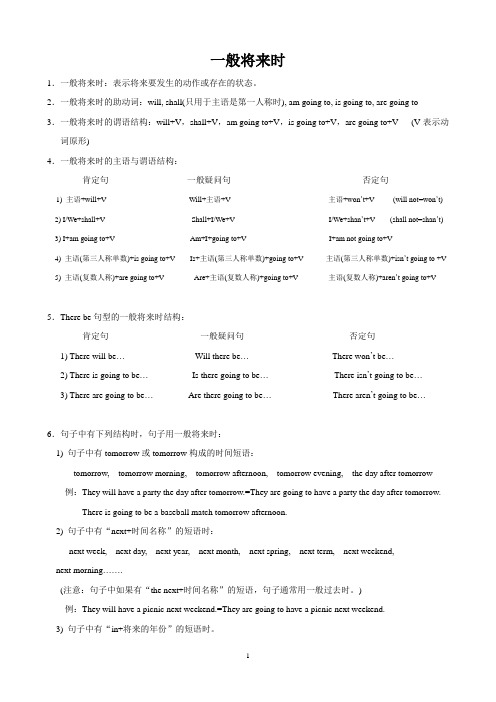
一般将来时1.一般将来时:表示将来要发生的动作或存在的状态。
2.一般将来时的助动词:will, shall(只用于主语是第一人称时), am going to, is going to, are going to3.一般将来时的谓语结构:will+V,shall+V,am going to+V,is going to+V,are going to+V (V表示动词原形)4.一般将来时的主语与谓语结构:肯定句一般疑问句否定句1) 主语+will+V Will+主语+V 主语+won’t+V (will not=won’t)2) I/We+shall+V Shall+I/We+V I/We+shan’t+V (shall not=shan’t)3) I+am going to+V Am+I+going to+V I+am not going to+V4) 主语(第三人称单数)+is going to+V Is+主语(第三人称单数)+going to+V 主语(第三人称单数)+isn’t going to +V5) 主语(复数人称)+are going to+V Are+主语(复数人称)+going to+V 主语(复数人称)+aren’t going to+V5.There be句型的一般将来时结构:肯定句一般疑问句否定句1) There will be…Will there be…There won’t be…2) There is going to be…Is there going to be…There isn’t going to be…3) There are going to be…Are there going to be…There aren’t going to be…6.句子中有下列结构时,句子用一般将来时:1) 句子中有tomorrow或tomorrow构成的时间短语:tomorrow, tomorrow morning, tomorrow afternoon, tomorrow evening, the day after tomorrow 例:They will have a party the day after tomorrow.=They are going to have a party the day after tomorrow.There is going to be a baseball match tomorrow afternoon.2) 句子中有“next+时间名称”的短语时:next week, next day, next year, next month, next spring, next term, next weekend,next morning…….(注意:句子中如果有“the next+时间名称”的短语,句子通常用一般过去时。
一般将来时——高考英语重点时态语态满分攻略
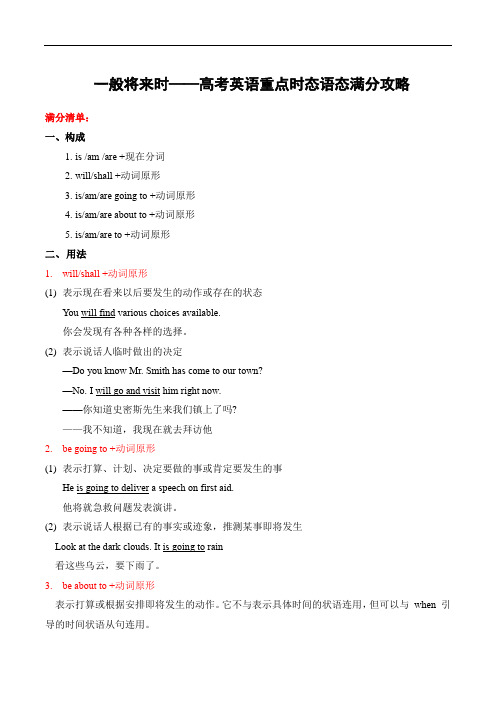
一般将来时——高考英语重点时态语态满分攻略满分清单:一、构成1.is /am /are +现在分词2.will/shall +动词原形3.is/am/are going to +动词原形4.is/am/are about to +动词原形5.is/am/are to +动词原形二、用法1.will/shall +动词原形(1)表示现在看来以后要发生的动作或存在的状态You will find various choices available.你会发现有各种各样的选择。
(2)表示说话人临时做出的决定—Do you know Mr. Smith has come to our town?—No. I will go and visit him right now.——你知道史密斯先生来我们镇上了吗?——我不知道,我现在就去拜访他2.be going to +动词原形(1)表示打算、计划、决定要做的事或肯定要发生的事He is going to deliver a speech on first aid.他将就急救问题发表演讲。
(2)表示说话人根据已有的事实或迹象,推测某事即将发生Look at the dark clouds. It is going to rain看这些乌云,要下雨了。
3.be about to +动词原形表示打算或根据安排即将发生的动作。
它不与表示具体时间的状语连用,但可以与when 引导的时间状语从句连用。
Ladies and gentlemen, you are about to hear a most incredible tale.女士们,先生们,你们马上就要听到一个令人非常难以置信的故事。
4.be to +动词原形(1)表示按计划或安排要做的事情The opening ceremony is to take place next Sunday.开幕式将于下周日举行。
(2)表示按职责、义务将要发生的动作You are to report it to the police.你应该报警。
完整版)一般将来时基本用法
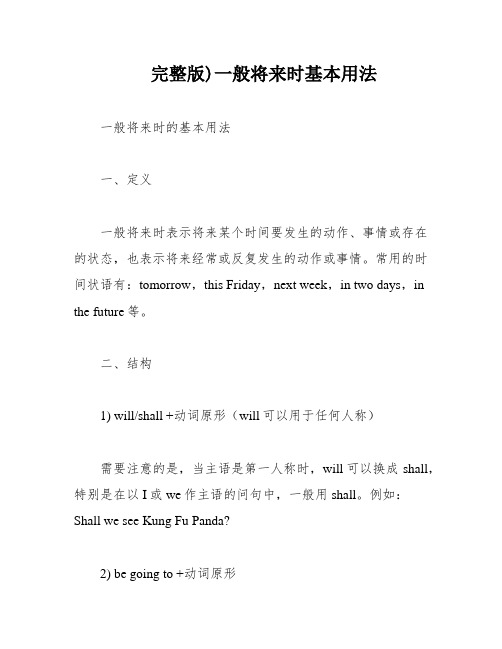
完整版)一般将来时基本用法一般将来时的基本用法一、定义一般将来时表示将来某个时间要发生的动作、事情或存在的状态,也表示将来经常或反复发生的动作或事情。
常用的时间状语有:tomorrow,this Friday,next week,in two days,in the future等。
二、结构1) will/shall +动词原形(will可以用于任何人称)需要注意的是,当主语是第一人称时,will可以换成shall,特别是在以I或we作主语的问句中,一般用shall。
例如:Shall we see Kung Fu Panda?2) be going to +动词原形例如:I’m going to play the piano。
be going to和will的区别be going to和will的用法虽然都表示将来发生动作或情况,一般情况下能互换。
但它们的用法是有区别的。
be going to主要用于:1、表示事先经过考虑、安排好打算、计划要做的事情。
例如:Dad and I are going to watch an opera this afternoon.2、表示根据目前某种迹象判断,某事非常有可能发生。
例如:Look。
There come the dark clouds。
It is going to rain.三、一般疑问句和否定句一般疑问句:1) will/shall +动词原形(will可以用于任何人称)——在will后加not2) be going to +动词原形——在be后加not例如:She will come back in three days.Will she not come back in three days?They are going to clean their classroom.Are they not going to clean their classroom?否定句:1) will/shall +动词原形(will可以用于任何人称)——将will提前2) be going to +动词原形——将be提前例如:She will come back in three days.She will not come back in three days.Will she come back in three days?XXX is whether they will actually do it。
关于英语一般将来时的用法
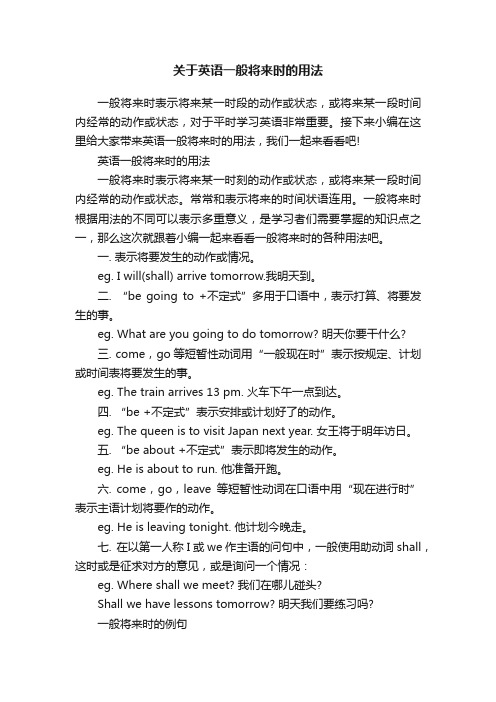
关于英语一般将来时的用法一般将来时表示将来某一时段的动作或状态,或将来某一段时间内经常的动作或状态,对于平时学习英语非常重要。
接下来小编在这里给大家带来英语一般将来时的用法,我们一起来看看吧!英语一般将来时的用法一般将来时表示将来某一时刻的动作或状态,或将来某一段时间内经常的动作或状态。
常常和表示将来的时间状语连用。
一般将来时根据用法的不同可以表示多重意义,是学习者们需要掌握的知识点之一,那么这次就跟着小编一起来看看一般将来时的各种用法吧。
一. 表示将要发生的动作或情况。
eg. I will(shall) arrive tomorrow.我明天到。
二. “be going to +不定式”多用于口语中,表示打算、将要发生的事。
eg. What are you going to do tomorrow? 明天你要干什么?三. come,go等短暂性动词用“一般现在时”表示按规定、计划或时间表将要发生的事。
eg. The train arrives 13 pm. 火车下午一点到达。
四. “be +不定式”表示安排或计划好了的动作。
eg. The queen is to visit Japan next year. 女王将于明年访日。
五. “be about +不定式”表示即将发生的动作。
eg. He is about to run. 他准备开跑。
六. come,go,leave等短暂性动词在口语中用“现在进行时”表示主语计划将要作的动作。
eg. He is leaving tonight. 他计划今晚走。
七. 在以第一人称I或we作主语的问句中,一般使用助动词shall,这时或是征求对方的意见,或是询问一个情况:eg. Where shall we meet? 我们在哪儿碰头?Shall we have lessons tomorrow? 明天我们要练习吗?一般将来时的例句1、He will get married. 他就快结婚了。
备战高考英语考点一遍过考点13将来时含解析

考点13 将来时高考频度:★★★☆☆考向一一般将来时1.shall用于第一人称,常被will 所代替。
will 在陈述句中用于各人称,在征求意见时常用于第二人称。
Which paragraph shall I read first? 我先读哪一段呢?Will you be at home at seven this evening? 今晚七点回家好吗?2.be going to +不定式,表示将来。
a. 主语的意图,即将做某事。
What are you going to do tomorrow? 明天打算作什么呢?b. 计划或安排要发生的事。
The play is going to be produced next month。
这出戏下月开播。
c. 有迹象要发生的事。
Look at the dark clouds, there is going to be a storm. 看那乌云,快要下雨了。
3.be +不定式表将来,按计划或正式安排将发生的事。
We are to discuss the report next Saturday. 我们下星期六讨论这份报告。
4.be about to +不定式,意为马上做某事。
He is about to leave for Beijing. 他马上要去北京。
注意:be about to do 不能与tomorrow, next week 等表示明确将来时的时间状语连用。
5.一般现在时表将来。
a. 下列动词come,go,arrive,leave,start,begin,return的一般现在时可以表示将来,主要用来表示在时间上已确定或安排好的事情。
The train leaves at six tomorrow morning. 火车明天上午六点开。
—When does the bus star? 汽车什么时候开?—It stars in ten minutes. 十分钟后。
【备战高考】英语一般将来时用法详解

【备战高考】英语一般未来时用法详解【备战高考】英语一般未来时用法详解一、单项选择一般未来时1.The purpose of education be to provide students with a value system–not to preparethem for a specific job.A. will B. should C. could D. may【答案】 A【分析】B观察神态动词。
句意:教育的目的是供应给学生一个有价值的系统,而不是为特定的工作进行准备。
Should 表示应当。
2.If my brother doesn’ t go to the evening party, .A. neither do I B. I will either C. either will I D. nor will I【答案】 D【分析】试题剖析:观察倒装句:句意:假如我弟弟不去晚会,我也不去。
Neither/Nor+ 倒装句,表示“ 也不是”,由于 if 条件句用一般此刻时,取代一般未来时,因此主句是一般未来时,选 D。
考点:观察倒装句3.— You’ ve left the light on.— Oh, so I have. _____ and turn it off.A. I go B. I ’ ve gone C. I ’ ll go D. I ’ m going【答案】 C【分析】试题剖析:观察时态:句意:--你向来把灯开着。
--哦,是的,我立刻去,把它关了。
这里用一般未来时, CD 都能够表示一般未来时,will do 能够表示暂时决定,be going to do 打算做,选 C。
考点:观察时态4. - Will you be available at three o'clock tomorrow afternoon?- No. I ______ a lecture then.A. are attending B. will have attended C. will attend D. will be attending【答案】 D【分析】试题剖析:观察动词时态。
一般将来时的用法

一般将来时的用法一般将来时(Simple Future Tense)是描述将来发生的事情或计划的一种时态。
在英语中,一般将来时的构成方式比较简单,一般使用助动词“will”或“be going to”来表示将来时态。
除了这两种方式外,还有其他一些用法和注意事项。
本文将详细介绍一般将来时的用法。
一、will的用法1. 表示意愿或决定:我们可以使用will表示即时决定或表示意愿。
例如:- I am thirsty. I will get some water.(我口渴了。
我要去倒些水。
)- He doesn't have a car, so I will lend him mine.(他没有车,所以我会借给他我的车。
)2. 表示预测或推测:will可用来表达对未来情况的推测或预测。
例如:- It's getting cloudy. I think it will rain soon.(天开始多云了。
我觉得很快就会下雨。
)- She is such a talented musician. I'm sure she will become famous one day.(她是一个非常有才华的音乐家。
我相信她总有一天会出名的。
)3. 提供承诺或请求:will也可以用来表示承诺或请求。
例如:- I will definitely help you with your project.(我一定会帮你完成你的项目。
)- Will you please pass me the salt?(请你把盐递给我好吗?)二、be going to的用法1. 表示计划或打算:be going to可以用来表示我们已经有了计划或打算要做某事。
例如:- I am going to visit my parents this weekend.(我打算这个周末去看望我的父母。
)- They are going to open a new restaurant in town.(他们打算在城里开一家新餐厅。
一般将来时用法总结
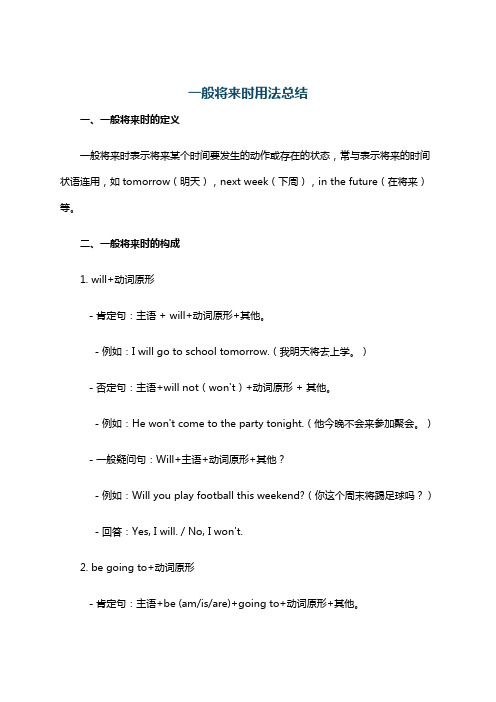
一般将来时用法总结一、一般将来时的定义一般将来时表示将来某个时间要发生的动作或存在的状态,常与表示将来的时间状语连用,如tomorrow(明天),next week(下周),in the future(在将来)等。
二、一般将来时的构成1. will+动词原形- 肯定句:主语 + will+动词原形+其他。
- 例如:I will go to school tomorrow.(我明天将去上学。
)- 否定句:主语+will not(won't)+动词原形 + 其他。
- 例如:He won't come to the party tonight.(他今晚不会来参加聚会。
) - 一般疑问句:Will+主语+动词原形+其他?- 例如:Will you play football this weekend?(你这个周末将踢足球吗?) - 回答:Yes, I will. / No, I won't.2. be going to+动词原形- 肯定句:主语+be (am/is/are)+going to+动词原形+其他。
- 例如:She is going to visit her grandparents next month.(她打算下个月去看望她的祖父母。
)- 否定句:主语+be (am/is/are)+not+going to+动词原形+其他。
- 例如:They are not going to have a meeting this afternoon.(他们今天下午不打算开会。
)- 一般疑问句:Be (am/is/are)+主语+going to+动词原形+其他?- 例如:Are you going to do your homework tonight?(你今晚打算做你的家庭作业吗?)- 回答:Yes, I am. / No, I'm not.三、一般将来时的用法1. 表示将来的计划或打算(be going to侧重于计划打算;will侧重于意愿)- I'm going to study hard this term.(我打算这个学期努力学习。
【备战高考】英语语法一般将来时归纳总结

【备战高考】英语语法一般将来时归纳总结一、单项选择一般将来时1.---Let’s throw a surprise party for mom’s 50th birthday.---That’s a good idea.We______several of her friends.A.invite B.have invited C.are inviting D.will invite【答案】D【解析】本题考查时态。
根据句意“我们将邀请她的一些朋友”可知用一般将来时。
句意:——让我们在妈妈50岁给她一个惊喜。
——好想法,我们将邀请她的一些朋友。
2.--- I’d like a mountain bike which ____ well?--- Will this one _____?A.rides; work B.rides; do C.is ridden; do D.is ridden; work【答案】B【解析】试题分析:考查主动形式表示被动含义用法。
一些不及物动词与副词连用,表示主语的特征。
如wash well,write well等;用主动形式表示被动的含义。
本句中的ride well指自行车好骑;第二空的do表示行。
句意:—我想买一辆很好骑的山地车。
—这个行吗?根据句意说明B正确。
考点:考查主动形式表示被动含义的用法。
点评:。
一些不及物动词与副词连用,表示主语的特征。
如wash well,write well等;用主动形式表示被动的含义。
3.The computers made by our company sell best, but several years ago no one could have imagined the role in the markets that they ________.A.were playing B.were to play C.had played D.played【答案】B【解析】试题分析:考查时态:我们公司生产的电脑卖的最好,但是几年以后没有人能想象它曾经将在市场中扮演什么样重要的角色。
【备战高考】英语一般将来时用法总结(完整)

【备战高考】英语一般将来时用法总结(完整)一、单项选择一般将来时1.— What do you want for breakfast, Mike?— I think I _______ some bread and milk.A.am going to have B.had C.will have D.am having【答案】C【解析】试题分析:句意:--迈克,你早饭想吃什么?--我想吃一些面包和牛奶。
因为是将来的事情,所以用一般将来时,will表示临时决定,符合句意,be going to计划,打算,be doing 即将做,都不符合句意。
所以选C。
考点:考查时态2.“When he _____ is not known yet.” “But when he ____, he will be warmly welcomed.”A.comes, comes B.will come, will comeC.comes, will come D.will come, comes【答案】D【解析】试题分析:考查时态:第一个when引导的主语从句,用将来时,第二个when引导的时间状语从句,用一般现在时代替一般将来时,句意:他什么时候来还不知道。
但当他回来时,他会收到热烈的欢迎。
选D。
考点:考查时态语态点评:时间条件状语从句的时态不能用一般将来时,而用一般现在时代替,考查时态还要注意语态。
3.AC Milan has confirmed that the England star David Beckham ______the team soon. A.has rejoined B.was going to rejoinC.rejoined D.is to rejoin【答案】D【解析】试题分析:考查时态。
本句考查的是将来时的一种表达法be to do sth将要做某事;句意:AC米兰俱乐部确认英国球星贝克汉姆将很快就重新加盟该队。
【备战高考】英语一般将来时用法详解

【备战高考】英语一般将来时用法详解一、单项选择一般将来时1. -- How many people are expected to come to your party tomorrow afternoon?-- I send out thirty invitations but one third _____.A.didn’t show up B.won’t show upC.hadn’t showed up D.doesn’t show up【答案】B【解析】试题分析:考查时态。
根据语境及时间状语tomorrow afternoon可知用一般将来时。
句意:——期望有多少人来参加你明天的宴会?——我送出了30份邀请,但三分之一将不会出现。
故B正确。
考点:考查时态2.If my brother doesn’t go to the evening party, .A.neither do I B.I will either C.either will I D.nor will I【答案】D【解析】试题分析:考查倒装句:句意:如果我弟弟不去晚会,我也不去。
Neither/Nor+倒装句,表示“…也不是”,因为if条件句用一般现在时,代替一般将来时,所以主句是一般将来时,选D。
考点:考查倒装句3.Japan’s economy _______ in the past twenty years. No one knows how long it ______ before it regains its increase.A.has been declining; will be B.has declined; would beC.had been in decline; would take D.was on the decline; will take【答案】A【解析】试题分析:考查动词的时态和语态,。
【备战高考】英语一般将来时用法详解
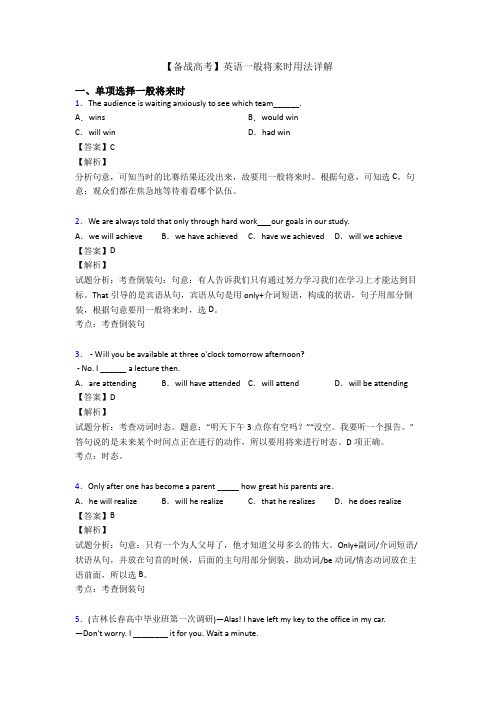
【备战高考】英语一般将来时用法详解一、单项选择一般将来时1.The audience is waiting anxiously to see which team______.A.wins B.would winC.will win D.had win【答案】C【解析】分析句意,可知当时的比赛结果还没出来,故要用一般将来时。
根据句意,可知选C。
句意:观众们都在焦急地等待着看哪个队伍。
2.We are always told that only through hard work our goals in our study.A.we will achieve B.we have achieved C.have we achieved D.will we achieve 【答案】D【解析】试题分析:考查倒装句:句意:有人告诉我们只有通过努力学习我们在学习上才能达到目标。
That引导的是宾语从句,宾语从句是用only+介词短语,构成的状语,句子用部分倒装,根据句意要用一般将来时,选D。
考点:考查倒装句3. - Will you be available at three o'clock tomorrow afternoon?- No. I ______ a lecture then.A.are attending B.will have attended C.will attend D.will be attending 【答案】D【解析】试题分析:考查动词时态。
题意:“明天下午3点你有空吗?”“没空。
我要听一个报告。
”答句说的是未来某个时间点正在进行的动作,所以要用将来进行时态。
D项正确。
考点:时态。
4.Only after one has become a parent _____ how great his parents are.A.he will realize B.will he realize C.that he realizes D.he does realize 【答案】B【解析】试题分析:句意:只有一个为人父母了,他才知道父母多么的伟大。
一般将来时的用法
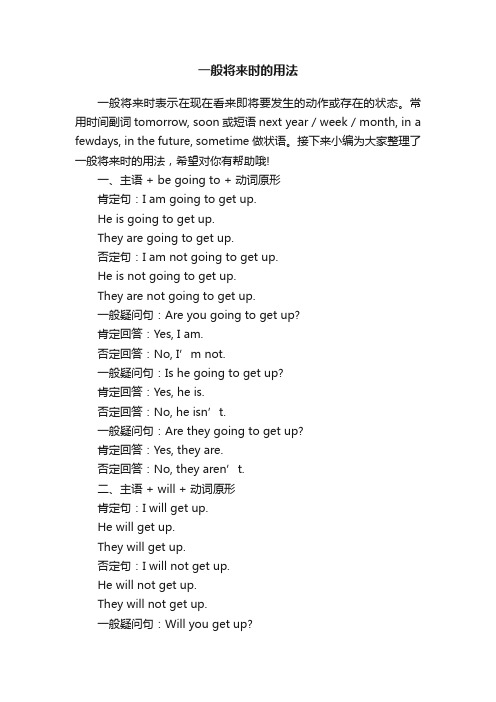
一般将来时的用法一般将来时表示在现在看来即将要发生的动作或存在的状态。
常用时间副词tomorrow, soon或短语next year / week / month, in a fewdays, in the future, sometime 做状语。
接下来小编为大家整理了一般将来时的用法,希望对你有帮助哦!一、主语 + be going to + 动词原形肯定句:I am going to get up.He is going to get up.They are going to get up.否定句:I am not going to get up.He is not going to get up.They are not going to get up.一般疑问句:Are you going to get up?肯定回答:Yes, I am.否定回答:No, I’m not.一般疑问句:Is he going to get up?肯定回答:Yes, he is.否定回答:No, he isn’t.一般疑问句:Are they going to get up?肯定回答:Yes, they are.否定回答:No, they aren’t.二、主语 + will + 动词原形肯定句:I will get up.He will get up.They will get up.否定句:I will not get up.He will not get up.They will not get up.一般疑问句:Will you get up?肯定回答:Yes, I will.否定回答:No, I won’t.一般疑问句:Will he get up.肯定回答:Yes, he will.否定回答:No, he won’t.一般疑问句:Are they going to get up?肯定回答:Yes, they are.否定回答:No, they aren’t.一般将来时/式(The Simple Future tense)时态定义be going to表主观的打算shall和will常常缩写成'll ,紧接在主语之后。
【备战高考】英语一般将来时用法详解

【备战高考】英语一般将来时用法详解一、单项选择一般将来时1. It is required that the students _____ mobile phones in their school, so seldom _____ them using one.A.should not use; you will seeB.mustn’t use; will you seeC.not use; you will seeD.not use; will you see【答案】D【解析】试题分析:考察情态动词。
前一个空中,should表示劝告,义务,建议,命令,其同义词是ought to ,在疑问句中,通常用should代替ought to。
后一个空前面有否定词seldom所以将will提前构成部分倒装。
该句意思为:学生在他们学校被要求不要使用手机,所以你很少看见他们用手机。
根据句意,故选D考点:考察情态动词。
2.---It ______ be only two days before I have the job interview.---______ you succeed.A.must; May B.must; Should C.will; May D.will; Should【答案】C【解析】试题分析:考查倒装句和时态。
第一空考查了固定句式中的时态。
固定句式:it be 一段时间 before从句;当Before引导的时间状语从句中使用一般现在时的时候,前面的主句使用将来时。
第二空使用倒装句的形式may you succeed祝你成功。
考点:考查倒装句和时态点评:固定句式:it be 一段时间 before从句;当Before引导的时间状语从句中使用一般现在时的时候,前面的主句使用将来时。
May放在句首,运用倒装句表示对对方的祝愿。
3.“When he _____ is not known yet.” “But when he ____, he will be warmly welcomed.”A.comes, comes B.will come, will comeC.comes, will come D.will come, comes【答案】D【解析】试题分析:考查时态:第一个when引导的主语从句,用将来时,第二个when引导的时间状语从句,用一般现在时代替一般将来时,句意:他什么时候来还不知道。
一般将来时的用法及常见句型总结

一般将来时的用法及常见句型总结一般将来时是英语中用来表示将来发生的动作或状态的一种时态。
在句子中,一般将来时通常与表示将来的时间状语词搭配使用,如tomorrow(明天)、next week(下周)、in the future(将来)等。
同时,一般将来时也可以使用助动词will或shall来构成。
下面将介绍一般将来时的用法及常见句型。
1. 一般将来时的肯定句结构:主语 + will/shall + 动词原形 + 其他成分例如:- I will go to the park tomorrow.(我明天将去公园。
)- They will watch a movie tonight.(他们今晚将要看电影。
)2. 一般将来时的否定句结构:主语 + will/shall + not + 动词原形 + 其他成分例如:- She will not join the party.(她不会参加派对。
)- We shall not travel to Europe.(我们不会去欧洲旅行。
)3. 一般将来时的疑问句结构:Will/Shall + 主语 + 动词原形 + 其他成分?- Will you come to the concert?(你会来听音乐会吗?)- Shall we visit the museum tomorrow?(我们明天要参观博物馆吗?)4. 一般将来时的特殊用法:a. 表示计划或安排例如:- We will have a meeting next Monday.(我们下周一要开会。
)- They will go on a vacation in August.(他们八月份将去度假。
)b. 表示意愿或意图例如:- He will help you with your homework.(他愿意帮你做作业。
)- She shall buy a new car soon.(她打算很快买辆新车。
)c. 表示预测或推断例如:- It will rain tomorrow.(明天会下雨。
【备战高考】英语语法一般将来时归纳总结
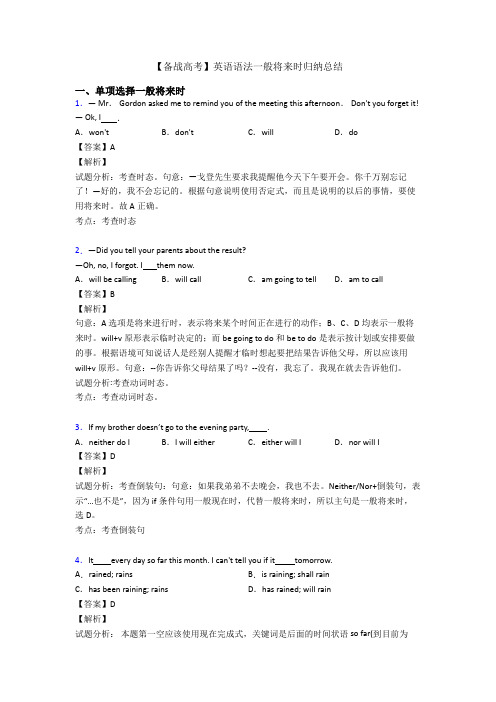
【备战高考】英语语法一般将来时归纳总结一、单项选择一般将来时1.— Mr. Gordon asked me to remind you of the meeting this afternoon. Don't you forget it!— Ok, I .A.won't B.don't C.will D.do【答案】A【解析】试题分析:考查时态。
句意:—戈登先生要求我提醒他今天下午要开会。
你千万别忘记了!—好的,我不会忘记的。
根据句意说明使用否定式,而且是说明的以后的事情,要使用将来时。
故A正确。
考点:考查时态2.—Did you tell your parents about the result?—Oh, no, I forgot. I them now.A.will be calling B.will call C.am going to tell D.am to call【答案】B【解析】句意:A 选项是将来进行时,表示将来某个时间正在进行的动作;B、C、D均表示一般将来时。
will+v原形表示临时决定的;而be going to do和be to do是表示按计划或安排要做的事。
根据语境可知说话人是经别人提醒才临时想起要把结果告诉他父母,所以应该用will+v原形。
句意:--你告诉你父母结果了吗?--没有,我忘了。
我现在就去告诉他们。
试题分析:考查动词时态。
考点:考查动词时态。
3.If my brother doesn’t go to the evening party, .A.neither do I B.I will either C.either will I D.nor will I【答案】D【解析】试题分析:考查倒装句:句意:如果我弟弟不去晚会,我也不去。
Neither/Nor+倒装句,表示“…也不是”,因为if条件句用一般现在时,代替一般将来时,所以主句是一般将来时,选D。
一般将来时语法总结归纳
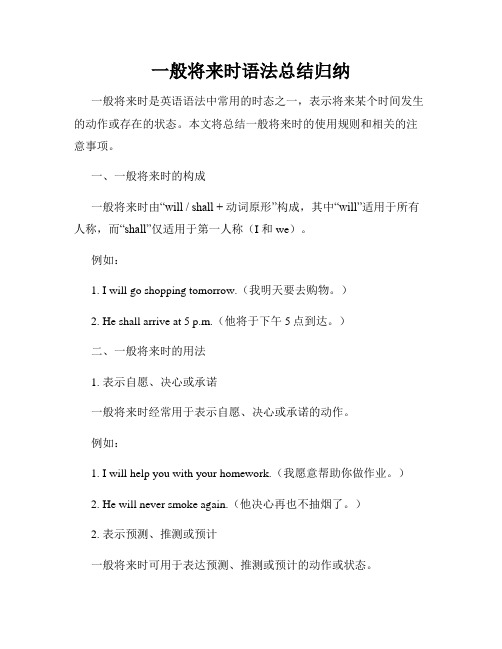
一般将来时语法总结归纳一般将来时是英语语法中常用的时态之一,表示将来某个时间发生的动作或存在的状态。
本文将总结一般将来时的使用规则和相关的注意事项。
一、一般将来时的构成一般将来时由“will / shall + 动词原形”构成,其中“will”适用于所有人称,而“shall”仅适用于第一人称(I 和 we)。
例如:1. I will go shopping tomorrow.(我明天要去购物。
)2. He shall arrive at 5 p.m.(他将于下午5点到达。
)二、一般将来时的用法1. 表示自愿、决心或承诺一般将来时经常用于表示自愿、决心或承诺的动作。
例如:1. I will help you with your homework.(我愿意帮助你做作业。
)2. He will never smoke again.(他决心再也不抽烟了。
)2. 表示预测、推测或预计一般将来时可用于表达预测、推测或预计的动作或状态。
例如:1. It will rain tomorrow.(明天会下雨。
)2. They will probably win the game.(他们很可能会赢得比赛。
)3. 表示习惯或反复发生的动作一般将来时可以用来表示根据过去的行为或事件推断将来会发生的动作。
例如:1. He will often call his parents.(他通常会给父母打电话。
)2. They will always eat dinner at home.(他们总是在家吃晚餐。
)4. 表示请求、邀请或建议一般将来时也可用于表示请求、邀请或建议的动作。
例如:1. Will you please close the window?(请你关上窗户好吗?)2. Shall we meet at the café?(我们要在咖啡馆见面吗?)三、注意事项1. 否定形式将"will not"缩写为"won't",放在动词之前。
一般将来时用法小结

一般将来时用法小结第一篇:一般将来时用法小结一般将来时用法小结:一般将来时表示在将来某个时间要发生的动作或存在的状态。
一.一般将来时的构成:1.由助动词“ shall/ will +动词原形”构成,shall 用于第一人称,will 用于第二、第三人称,2.一般将来时的否定和疑问形式:一般将来时的否定形式是will not,缩写为won't;shall not,缩写为 shan't。
一般将来时的疑问形式是把 will/ shall 提到主语前。
如:He won’t go to the park this Sunday.本周日他不去公园。
Will you go swimming with me? 和我一起去游泳好吗?二.一般将来时的基本用法:1.表示“纯粹的将来”:①表示将要发生的动作或情况,常带有表示将来的时间状语,如 tomorrow, next week, in two days, from now on 等。
如: It will be fine tomorrow.明天天气晴朗。
②表示预料将要发生的动作或情况。
如: You will feel better after having this medicine.吃了这药,你就会感觉好些的。
③表示由于习惯倾向而会经常发生的动作,本用法中的 will 要重读。
如: Boys will be boys.[谚语]男孩毕竟是男孩。
2.表示“带有情态意义的将来”,用来表示意图,用will 来表示。
如:I will be more careful next time.下次我要更加小心。
I won't go shopping this afternoon, but she will.今天下午我不想去购物,但她想去。
will 在疑问句中,用来表示有礼貌地征询对方的意见。
如:Will you have some more tea? 要不要再喝点茶?What shall we do this weekend? 本周末我们要干什么?三.一般将来时的其它几种表示法:1.用be going to 表示be going to 相当于一个助动词,与其后的动词原形一起构成句子的谓语,表示近期将要发生的动作或存在的状态如: I'm going to see a film this afternoon.今天下午我想去看电影。
- 1、下载文档前请自行甄别文档内容的完整性,平台不提供额外的编辑、内容补充、找答案等附加服务。
- 2、"仅部分预览"的文档,不可在线预览部分如存在完整性等问题,可反馈申请退款(可完整预览的文档不适用该条件!)。
- 3、如文档侵犯您的权益,请联系客服反馈,我们会尽快为您处理(人工客服工作时间:9:00-18:30)。
【备战高考】英语一般将来时用法总结(完整)一、单项选择一般将来时1.— What do you want for breakfast, Mike?— I think I _______ some bread and milk.A.am going to have B.had C.will have D.am having【答案】C【解析】试题分析:句意:--迈克,你早饭想吃什么?--我想吃一些面包和牛奶。
因为是将来的事情,所以用一般将来时,will表示临时决定,符合句意,be going to计划,打算,be doing 即将做,都不符合句意。
所以选C。
考点:考查时态2.If their marketing plans succeed, they ________ their sales by 20 percent.A.will increase B.have been increasingC.have increased D.would be increasing【答案】A【解析】句意:要是他们的市场计划成功了,他们将增加20%的销售额。
从句是一般现在时表将来,主句常用一般将来时或情态动词can/may+动词原形。
3.---It ______ be only two days before I have the job interview.---______ you succeed.A.must; May B.must; Should C.will; May D.will; Should【答案】C【解析】试题分析:考查倒装句和时态。
第一空考查了固定句式中的时态。
固定句式:it be 一段时间 before从句;当Before引导的时间状语从句中使用一般现在时的时候,前面的主句使用将来时。
第二空使用倒装句的形式may you succeed祝你成功。
考点:考查倒装句和时态点评:固定句式:it be 一段时间 before从句;当Before引导的时间状语从句中使用一般现在时的时候,前面的主句使用将来时。
May放在句首,运用倒装句表示对对方的祝愿。
4.A good film producer must make sure that his films ____ fit into the needs of the changing market.A.are to B.will C.are going to D.are about to【答案】A【解析】试题分析:考查将来时的表达法。
Be to do sth表示计划的事情;表示注定要做某事;也可以表示命令做某事,相当于have to, must,should; will表示一般的将来,或者临时决定做某事;be going to do sth表示按照计划安排要做某事;或者根据某种迹象要做某事;be about to do sth即将做某事,不与表示将来时的时间状语连用。
句意:好的电影出品人要确保他的电影应该满足不断变化的市场的需要。
该句中的be to =should.故A正确。
考点:考查将来时的表达法点评:Be to do sth表示计划的事情;表示注定要做某事;也可以表示命令做某事,相当于have to, must,should; will表示一般的将来,或者临时决定做某事;be going to do sth表示按照计划安排要做某事;或者根据某种迹象要做某事;be about to do sth即将做某事,不与表示将来时的时间状语连用。
5.--- I’d like a mountain bike whic h ____ well?--- Will this one _____?A.rides; work B.rides; do C.is ridden; do D.is ridden; work【答案】B【解析】试题分析:考查主动形式表示被动含义用法。
一些不及物动词与副词连用,表示主语的特征。
如wash well,write well等;用主动形式表示被动的含义。
本句中的ride well指自行车好骑;第二空的do表示行。
句意:—我想买一辆很好骑的山地车。
—这个行吗?根据句意说明B正确。
考点:考查主动形式表示被动含义的用法。
点评:。
一些不及物动词与副词连用,表示主语的特征。
如wash well,write well等;用主动形式表示被动的含义。
6.However hard he tries,the recorder .A.didn’t work B.won’t work C.isn’t working D.hasn’t worked【答案】B【解析】试题分析:考查will用法。
句意:无论他多么努力尝试,这个录音机就不工作了。
本题中的will表示的是一种倾向性,如The door won’t open.故B正确。
考点:考查will用法点评:情态动词will有多种不同的用法,will可以表示临时决定做某事;或者表示将来时。
7.—Did you tell your parents about the result?—Oh, no, I forgot. I them now.A.will be calling B.will call C.am going to tell D.am to call【答案】B【解析】句意:A 选项是将来进行时,表示将来某个时间正在进行的动作;B、C、D均表示一般将来时。
will+v原形表示临时决定的;而be going to do和be to do是表示按计划或安排要做的事。
根据语境可知说话人是经别人提醒才临时想起要把结果告诉他父母,所以应该用will+v原形。
句意:--你告诉你父母结果了吗?--没有,我忘了。
我现在就去告诉他们。
试题分析:考查动词时态。
考点:考查动词时态。
8.Only by practising a few hours every day ________ be able to play the piano well.A.you would B.would you C.you will D.will you【答案】D【解析】试题分析:考查倒装句和时态:句意:只有你每天练习几个小时,你才能把钢琴弹好。
Only+副词/介词短语/状语从句+主句(主句用部分倒装),而且这句话的时间是every day,所以用一般现在时will,选D。
考点:考查倒装句和时态9.—You’ve left the light on.— Oh, so I have. _____ and turn it off.A.I go B.I’ve gone C.I’ll go D.I’m going【答案】C【解析】试题分析:考查时态:句意:--你一直把灯开着。
--哦,是的,我马上去,把它关了。
这里用一般将来时,CD都可以表示一般将来时,will do可以表示临时决定,be going to do打算做,选C。
考点:考查时态10.Only after one has become a parent _____ how great his parents are.A.he will realize B.will he realize C.that he realizes D.he does realize【答案】B【解析】试题分析:句意:只有一个为人父母了,他才知道父母多么的伟大。
Only+副词/介词短语/状语从句,并放在句首的时候,后面的主句用部分倒装,助动词/be动词/情态动词放在主语前面,所以选B。
考点:考查倒装句11.The project to developing the economy and reducing poverty when it is completed. A.has contributed B.had been contributedC.will contribute D.is contribute【答案】C【解析】试题分析:考查动词的时态。
句意:这项工程在竣工后,将会继续发展经济,减少贫穷。
根据句意可知表示将要发生的事情,用一般将来时,选C考点 : 考查动词的时12.“What do you want to be?” asked Mrs. Crawford. “Oh, I ________ president,” said the boy, with a smile.A.have been B.amC.was D.will be【答案】D【解析】试题分析:考查动词的时态。
句意:Crawford夫人问道:“你(长大了)想干什么?”“哦,我想当总统。
”男孩面带微笑地说。
根据问句“What do you want to be?”可知,该句中暗含“when you grow up”,因此回答用一般将来时。
13.(陕西重点中学高三二模)We pursue happiness, thinking one day we will find it. But________ it by seeking it.A.rarely will we find B.rarely we will findC.rarely will find we D.rarely find we will【答案】A【解析】选A考查倒装。
句意:我们追求幸福,想着总有一天会找到幸福。
但是,我们几乎不能通过一味追求幸福而找到幸福。
否定副词放在句首时,句子要部分倒装。
A项正确。
14.Turn on the television or open a magazine and you ________ advertisements showing happy families.A.will often see B.often seeC.are often seeing D.have often seen【答案】A【解析】考查“祈使句+and +陈述句”句型。
祈使句相当于一个条件状语从句,and后的陈述句的谓语用一般将来时,这是一个较为固定的句型。
15.–Are you available at 3 tomorrow afternoon?--Sorry, I ________ a meeting at that time.A.am having B.will be having C.will have D.have【答案】B【解析】试题分析:考查时态。
根据时间状语at 3 tomorrow afternoon可知用将来进行时,表示将来时间点正在发生的动作。
句意:——明天下午3点钟你在吗?——对不起,那时候我将正在开会。
故B正确。
